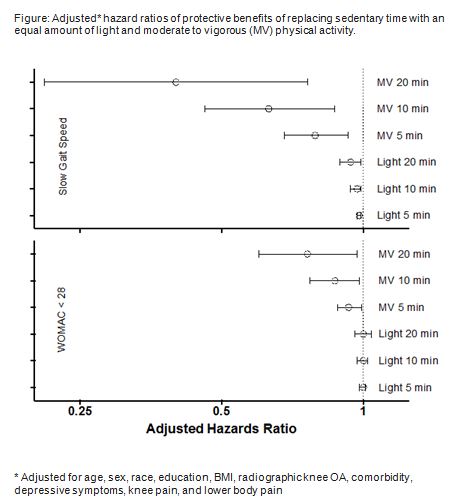Session Information
Date: Wednesday, November 16, 2016
Title: Osteoarthritis – Clinical Aspect II: Treatment and Imaging
Session Type: ACR Concurrent Abstract Session
Session Time: 9:00AM-10:30AM
Background/Purpose: Physical activity protects the development of functional limitation in knee osteoarthritis (OA). But little is known about the protective effects of physical activity intensity, i.e., light and moderate to vigorous physical activity (MVPA). Knee OA-related pain may limit higher intensity activity, and the benefit of light intensity activity is not known. Moreover, it is unclear what amount of light intensity activity may be necessary to equal the health benefits attained from MVPA. The purpose of this study was to investigate the association of replacing sedentary time with light intensity and MVPA with the development of functional limitation two years later in people with or at high risk of knee OA.
Methods: Physical activity was objectively measured with an accelerometer in a subcohort of adults from the Osteoarthritis Initiative (OAI) at the 48- and 72-month visits (our study baselines). We included participants with at least four 10-hour days of valid monitoring and classified time in sedentary, light, and MVPA using established thresholds. Incident functional limitation over two years was assessed by: 1) Slow gait speed (< 1.0 meters/sec during a 20-meter walk), 2) Low WOMAC physical function (≥ 28; range 0-68) and 3) Low SF-12 (<40; range 0-100). We evaluated the association of replacing sedentary time with light or MVPA with incident functional limitation risk over two years using isotemporal substitution models. Hazard ratios were estimated from discrete survival models. All analyses were adjusted for potential confounders.
Results: We included 1873 study subjects (mean age (sd) = 65.0 years (9.0), 54.6% women, mean BMI (sd) = 28.4 kg/m2 (4.7). Replacing 5 minutes of sedentary time with 5 min of light activity reduced the incident risk for slow gait function by 2%. Replacing with 5 min of MVPA reduced the risk by 21%. 78 min of light activity is necessary to achieve the same protective benefit of 5 min of MPVA. Replacing sedentary time with MVPA but not light activity significantly reduced the incident risk of low WOMAC. The protective effect of replacing sedentary time with light activity or MVPA was amplified with longer replacement periods. See Figure
Conclusion: Replacing sedentary time with light or MVPA reduced the risk of incident functional limitation. The protective effects of MVPA outweighed light activity.
To cite this abstract in AMA style:
White D. Protective Effects of Replacing Sedentary Time with Light and Moderate to Vigorous Physical Activity on Functional Limitation in Knee OA [abstract]. Arthritis Rheumatol. 2016; 68 (suppl 10). https://acrabstracts.org/abstract/protective-effects-of-replacing-sedentary-time-with-light-and-moderate-to-vigorous-physical-activity-on-functional-limitation-in-knee-oa/. Accessed .« Back to 2016 ACR/ARHP Annual Meeting
ACR Meeting Abstracts - https://acrabstracts.org/abstract/protective-effects-of-replacing-sedentary-time-with-light-and-moderate-to-vigorous-physical-activity-on-functional-limitation-in-knee-oa/

